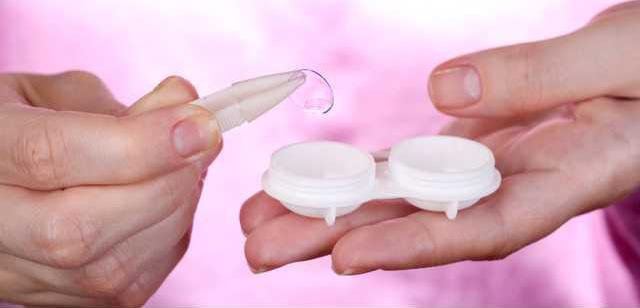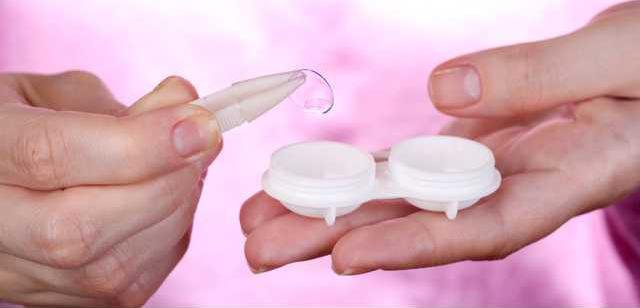Irenie Ekkeshi was 12 when she switched from glasses to contacts. It was a decision that, combined with bad luck and lack of information, eventually made her lose sight in her right eye years later.
When Ekkeshi woke up with tears streaming from her right eye in 2011, she didnt think much of it. She went to a drugstore for eye drops and assumed whatever infection she had would be gone in a few days, according to a BBC article.
But when the infection got worse and Ekkeshis eye became sensitive to light, she went to a doctor to see what was really going on.
The diagnosis was Acanthamoeba Keratitis (AK), and the potential cause was shocking
The micro-organism that causes AK is commonly found in water: tap water, sea water and swimming pools.
Although her infection was rare, it was very serious.
"I was feeling very shocked and frightened, as by then I had lost the vision in my right eye, Ekkeshi told BBC. It was like looking through a foggy bathroom mirror. I could see colours and shapes but not much else".
She had never been warned of the danger of water on contacts
Ekkeshi was using daily disposable lenses, which many doctors highly recommend since there is less risk of bacteria to build up on them. She hadnt gone swimming or showered with these, but she quickly learned that even washing your hands without completely drying them can put someone at risk for AK.
Her infection caused unbearable pain, so much so that she had to eventually quit her job. It took months for the doctors to get the infection under control. By that point, Ekkeshi's cornea was scarred.
Since that time, Ekkeshi has undergone two corneal transplants on her right eye. Unfortunately, things didnt go well with either transplant, and Ekkeshi has completely lost the vision in that eye.
Raising awareness
Its now been six years since Ekkeshis infection first started. According to BBC, doctors say its unlikely she will ever regain vision in her right eye, which now droops as well.
And although being visually impaired has been a hard transition for Ekkeshi to make, shes determined to raise the awareness she learned before.
While she was fighting her infection, Ekkeshi realized none of her friends and family who also wear contact lenses were aware of the potential danger water has for contact wearers. She contacted the British Contact Lens Association (BCLA) and asked why lens boxes didnt have warning labels.
There wasnt room for the warning on the box
The BCLA told Ekkeshi there was no room for the warning on the box, so Ekkeshi took matters into her own hands and created the label herself. The logo displays a No Water symbol.
At that point the industry realised I was serious and they became supportive. We produced these No Water stickers that opticians could stick on boxes," she told BBC.
Her campaign has spread to the United States, and her goal is to have the No water graphic on all lens boxes.
The simple message Ekkeshi is trying to share with every contact wearer is to never let lenses come in contact with water. She hopes she can save anyone like her from the devastating effects shes experienced from a simple infection.
When Ekkeshi woke up with tears streaming from her right eye in 2011, she didnt think much of it. She went to a drugstore for eye drops and assumed whatever infection she had would be gone in a few days, according to a BBC article.
But when the infection got worse and Ekkeshis eye became sensitive to light, she went to a doctor to see what was really going on.
The diagnosis was Acanthamoeba Keratitis (AK), and the potential cause was shocking
The micro-organism that causes AK is commonly found in water: tap water, sea water and swimming pools.
Although her infection was rare, it was very serious.
"I was feeling very shocked and frightened, as by then I had lost the vision in my right eye, Ekkeshi told BBC. It was like looking through a foggy bathroom mirror. I could see colours and shapes but not much else".
She had never been warned of the danger of water on contacts
Ekkeshi was using daily disposable lenses, which many doctors highly recommend since there is less risk of bacteria to build up on them. She hadnt gone swimming or showered with these, but she quickly learned that even washing your hands without completely drying them can put someone at risk for AK.
Her infection caused unbearable pain, so much so that she had to eventually quit her job. It took months for the doctors to get the infection under control. By that point, Ekkeshi's cornea was scarred.
Since that time, Ekkeshi has undergone two corneal transplants on her right eye. Unfortunately, things didnt go well with either transplant, and Ekkeshi has completely lost the vision in that eye.
Raising awareness
Its now been six years since Ekkeshis infection first started. According to BBC, doctors say its unlikely she will ever regain vision in her right eye, which now droops as well.
And although being visually impaired has been a hard transition for Ekkeshi to make, shes determined to raise the awareness she learned before.
While she was fighting her infection, Ekkeshi realized none of her friends and family who also wear contact lenses were aware of the potential danger water has for contact wearers. She contacted the British Contact Lens Association (BCLA) and asked why lens boxes didnt have warning labels.
There wasnt room for the warning on the box
The BCLA told Ekkeshi there was no room for the warning on the box, so Ekkeshi took matters into her own hands and created the label herself. The logo displays a No Water symbol.
At that point the industry realised I was serious and they became supportive. We produced these No Water stickers that opticians could stick on boxes," she told BBC.
Her campaign has spread to the United States, and her goal is to have the No water graphic on all lens boxes.
The simple message Ekkeshi is trying to share with every contact wearer is to never let lenses come in contact with water. She hopes she can save anyone like her from the devastating effects shes experienced from a simple infection.








